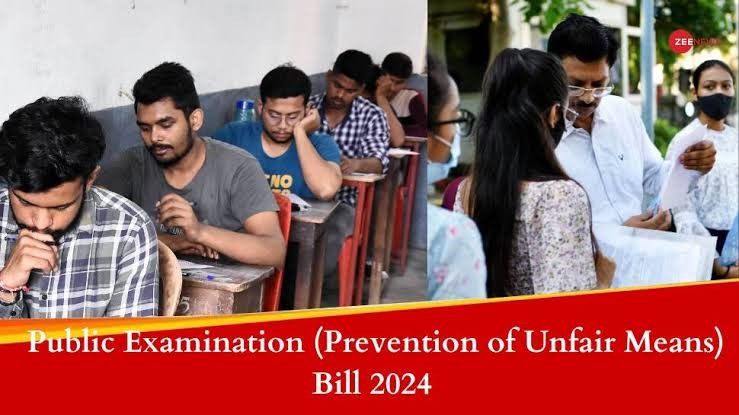
Public Examinations (Prevention of Unfair Means) Bill, 2024

06.02.2024
Public Examinations (Prevention of Unfair Means) Bill, 2024 , Daily Current Affairs , RACE IAS : Best IAS Coaching in Lucknow
|
For Prelims:What is meant by the use of “unfair means” in an examination,About the bill (Objective,Applicability,Punishments |
Why in the news?
The Public Examinations (Prevention of Unfair Means) Bill, 2024, was introduced in Lok Sabha recently.
Key Points
- The bill mandates a maximum jail term of 10 years and a fine of up to Rs 1 crore for malpractices and irregularities in competitive examinations.
- The Bill aims to prevent “unfair means” in order to “bring greater transparency, fairness and credibility to the public examinations system”.
What is meant by the use of “unfair means” in an examination?
- Section 3 of the Bill lists at least 15 actions that amount to using unfair means in public examinations “for monetary or wrongful gain”.
- These acts include:
○ “leakage of question paper or answer key or part thereof” and colluding in such leakage;
○“accessing or taking possession of question paper or an Optical Mark Recognition response sheet without authority”;
○“tampering with answer sheets including Optical Mark Recognition response sheets”;
○ “providing solutions to one or more questions by any unauthorized person during a public examination”, and ○“directly or indirectly assisting the candidate” in a public examination.
- The section also lists “tampering with any document necessary for short-listing of candidates or finalizing the merit or rank of a candidate”;
○“tampering with the computer network or a computer resource or a computer system”;
○“creation of fake websites” and “conduct of fake examinations, issuance of fake admit cards or offer letters to cheat or for monetary gain” as illegal acts.
About the bill
- The bill comes in the backdrop of a cancellation of a series of competitive tests such as:
○the teacher recruitment exam in Rajasthan,
○Common Eligibility Test (CET) for Group-D posts in Haryana,
○recruitment exam for junior clerks in Gujarat and
○constable recruitment examination in Bihar following question paper leaks.
- As per various reports, more than 1.5 crore students have been affected by paper leaks from 2016 to 2023.
- More than 70 cases of question paper leaks have occurred in the same period.
- At least a dozen recruitment drives have been cancelled owing to paper leaks in the state between 2018 and February 2023.
- Since 2014, 615 accused have been arrested in connection with 33 cases of government recruitment paper leaks.
- At present, there is no specific law to deal with unfair means adopted or offences committed by various entities involved in the conduct of public examinations by the central government and its agencies.
Key highlights of the bill
Objective
- to bring greater transparency, fairness and credibility to the public examination systems and
- to reassure the youth that their sincere and genuine efforts will be fairly rewarded and their future is safe.
Applicability
- The bill is applicable to central recruitment and entrance exams conducted by:
○the Union Public Service Commission (UPSC),
○Staff Selection Commission (SSC),
○Railway Recruitment Boards (RRBs),
○Institute of Banking Personnel Selection (IBPS), and
○National Testing Agency (NTA).
- The NTA conducts exams for admission to higher educational institutions, like the Joint Entrance Examination (JEE) for engineering, National Eligibility Cum Entrance Test (NEET) for medical, and Common University Entrance Test (CUET) for undergraduate and post-graduate studies.
- Apart from these designated public examination authorities, all central ministries and departments, as well as their offices for recruitment, will also come under the purview of the new law.
Does not target students
- The Bill provides punishment for persons, organized groups or institutions indulging in unfair means for monetary or wrongful gains.
- However, candidates appearing for the exams have been left out of its purview.
- Candidates shall continue to be covered under the extant administrative provisions of the public examination authority concerned.
Punishments
- The bill mandates a three-to-five-year prison term for involvement in paper leak cases.
- However, in cases where a link to organized crime is proven it calls for a prison sentence of up to 10 years.
- It imposes a fine of Rs 1 crore and recovers the cost of conducting examinations from firms.
- It says a firm also may be barred from conducting public exams for years in case of a conviction.
Source: Indian Express